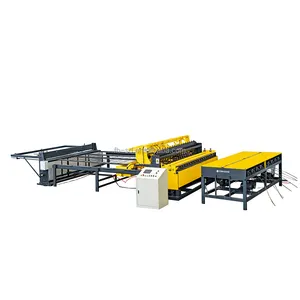(1585 products available)

































































































































































































































An expanded metal mesh making machine can produce a variety of materials to meet different needs. These are some of the typical types and their distinguishing features.
Expanded metal mesh making machines are useful in many industries and production lines. Here are some typical usage scenarios for these machines:
Architectural industries
Expanded metal mesh machines allow the creation of distinctive architectural designs, such as enclosures, screens, and decorative panels. These architectural-grade metal mesh materials enable designers to achieve attractive visual effects while providing ventilation and natural lighting.
Automotive industries
In the automotive industry, expanded metal mesh machines create various car components, such as grilles, heat dissipation screens, protective covers, etc. Expanded metal mesh materials offer lightweight and strong solutions to meet the needs of automotive manufacturers for quality and performance.
Aerospace industries
Aerospace industries rely on expanded metal mesh machines for lightweight structural components, such as aircraft floor beams, frame meshes, and more. Expanded metal mesh materials have high strength-to-weight ratios, making them well-suited for the aerospace industry.
Security industries
The security industry uses expanded metal mesh machines to produce protective items like security screens, anti-theft window guards, and surveillance camera casings. The security metal mesh materials offer excellent protection and safety, helping to prevent theft and intrusions.
Packaging industries
Expanded metal mesh making machines allow the production of various metal mesh packaging materials, such as product cages, pallets, and partitions, etc. These packaging materials offer exceptional protection and support, meeting the logistics and transportation needs of multiple industries.
Pet products
Pet product businesses can use expanded metal mesh machines to make pet cages, animal enclosures, etc. The metal mesh products are durable and well-ventilated, providing a safe and comfortable living environment for pets.
Home decor
Home decor uses expanded metal mesh machines to produce decorative elements like room dividers, wall decorations, and art projects. These expanded metal mesh products add a unique artistic touch to the interiors.
When purchasing an expanded metal mesh making machine, buyers should consider these factors:
Production capacity
Production capacity is the amount of metal mesh the machine can produce in a given time. It is usually stated in units per hour or per day. Buyers should choose a machine with an ideal production capacity for their business needs. A high production capacity ensures that the buyer can meet the market demand.
Material compatibility
Buyers need to consider the machine's material compatibility to ensure it can process the intended materials. Different expanded metal mesh machines have material compatibility. For example, some can only process metal sheets, while others can handle various types of alloys.
Automation and control system
These machines differentiate themselves from manual operation and automation. Some machines have a simple manual control system, while others are more advanced, with automatic feeding, stretching, and cutting.
Machine dimensions and weight
The dimensions of the machine will affect its installation requirements and production floor space. The weight of the machine is also important because it will affect how it is transported and installed. Buyers need to ensure that the required transportation and installation facilities are available to handle the machine.
Energy consumption and efficiency
This factor is extremely important for industrial production. Buyers should choose a machine with reasonable energy consumption to ensure production efficiency at a low operating cost.
Safety features
The safety characteristics of the machine, like emergency stop buttons and protective covers, should be considered by the buyer. These features improve overall operating safety, thus reducing the danger of operator injury.
Machine price and total ownership cost
When examining the machine's price, buyers should consider the total ownership cost, including energy consumption, maintenance costs, and replacement parts availability.
Q1: What kind of metal can the expanded metal mesh making machine work with?
A1: The machine usually works with various materials, including carbon steel, aluminum alloy, stainless steel, and hot-dip galvanized alloy.
Q2: How does the expanded metal mesh making machine increase productivity?
A2: The expanded metal mesh making machines automate the expanding process, reducing manual labor and increasing production speed. It also streamlines mesh cutting and trimming.
Q3: What should buyers look for when purchasing an expanded metal mesh making machine?
A3: When buying, one should consider the machine's capacity, the materials it can process, its automation level, and any additional features. It's also essential to read manufacturer reviews and compare different models.
Q4: Do expanded metal mesh making machines come with safety features?
A4: Yes, they typically have safety features like emergency stop buttons and guarded moving parts to protect operators. Users should always follow safety guidelines and proper operating procedures.